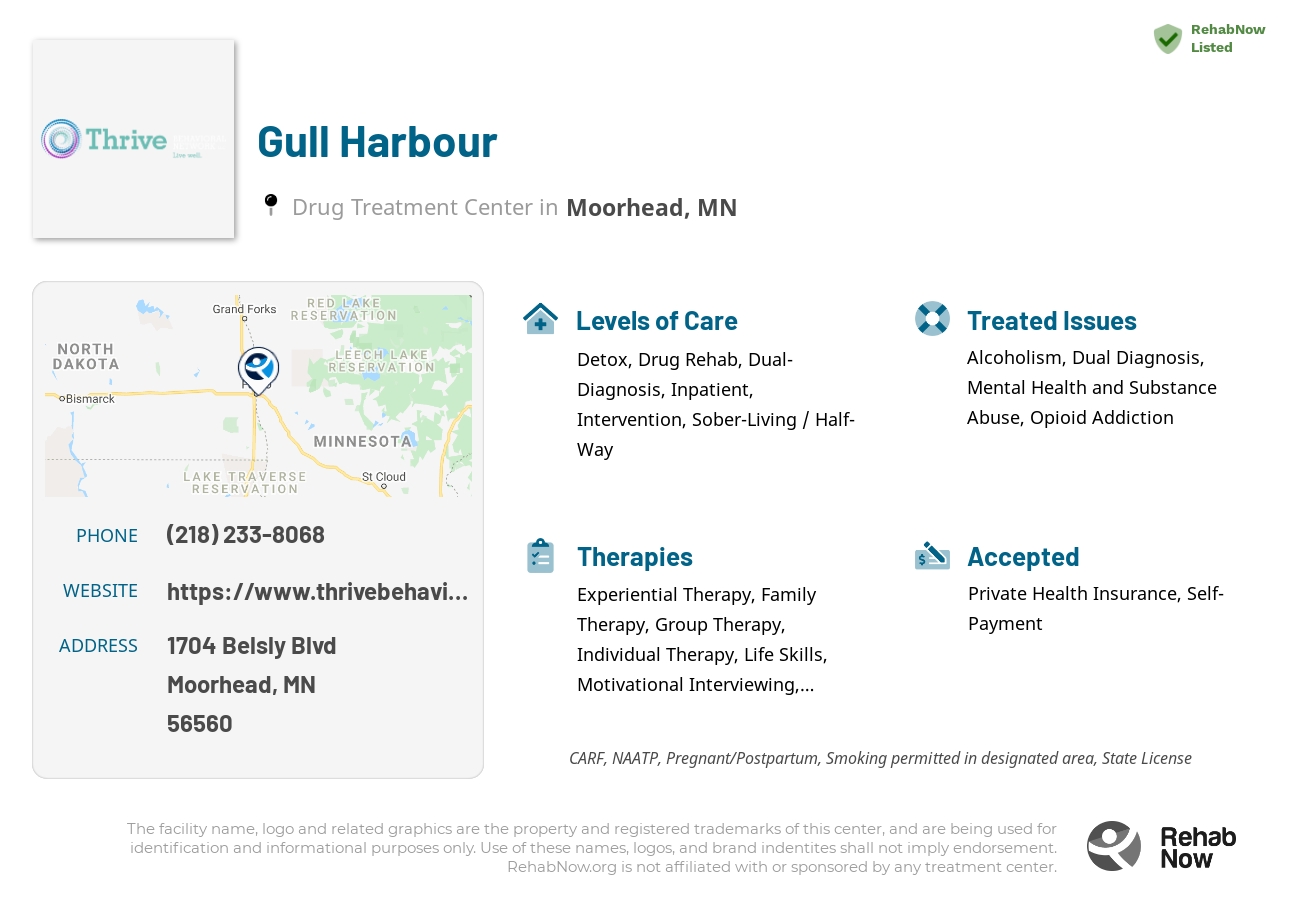Gull Harbour
Drug Rehab Center in Moorhead, Minnesota
Gull Harbour in Moorhead, Minnesota is an addiction treatment facility that provides a wide range of services, including detox, rehab, inpatient, intervention, and residential care, helping individuals struggling with alcoholism, drug addiction, dual diagnosis, mental health, and substance abuse.
About Gull Harbour in Minnesota
Located in Moorhead, MN, Gull Harbour provides an Intensive Residential Treatment Services (IRTS) program, uniquely focusing on aiding individuals to reach psychiatric stability, and enhance their personal and emotional adjustment toward self-sufficiency. The facility sets itself apart by offering a comforting, secure environment and prioritizing a home-like atmosphere while delivering quality, individualized care.
- Individualized Treatment Plans: Tailored assessments and treatment to meet each person's unique needs.
- 24/7 Support Services: Around-the-clock supportive services fostering independence and self-sufficiency.
- Comprehensive Skill Building: From medication management to vocational skills and independent living development.
Gull Harbour holds a state license, signifying its commitment to maintaining high-quality care standards. The program integrates local mental health resources for a holistic approach, ensuring that each individual has access to the most effective treatments and supports.
The center successfully addresses issues such as dual diagnosis, opioid addiction, alcoholism, and other substance abuses, with a treatment model that includes crisis intervention, nursing services, and transition planning. Offering both intensive residential care and a myriad of supportive services, Gull Harbour is dedicated to aiding recovery and personal growth.
Genders
Ages
Modality
Additional
Accreditations
State License
Conditions and Issues Treated
Opioid addiction starts when a person becomes addicted to legal or illegal opioids. The addiction can happen quickly, in just a matter of days. Opioid withdrawal can be extremely uncomfortable and lead the user to continue to use even if they want to quit. Stopping using an opioid requires medical observation. Sometimes inpatient treatment with a medically supervised detox is necessary for managing the withdrawal process while learning lasting tools for maintaining recovery. Medications may be used in some cases of opioid addiction.
Opioid addiction is one of Minnesota‘s most prominent forms of addiction. It’s treated by detoxifying the body so that the chemicals from the medications no longer impact them and by therapies to correct behavior and target the root of the problem.
Recovery is not simply about stopping drug use. Recovery is working with addiction while recovering mental health issues that are fueling the addiction in the first place.
Levels of Care Offered
This center offers a variety of custom treatment tailored to individual recovery. Currently available are Detox, Drug Rehab, Dual-Diagnosis, Inpatient, Intervention, Residential, Sober-Living / Half-Way, with additional therapies available as listed below.
Detox is the first step of rehab. It involves giving a person time to get the toxins out of their body. During detox, the patient gets ill and they will often start using again to get rid of these unpleasant feelings. That’s why it’s so important to have a Moorhead medical professional at Gull Harbour present. A Minnesota medical professional will make sure patients don’t start using during detox. They will also provide medication to ease their symptoms and coach them through on a mental level.
Individuals who are suffering from severe addiction or have a high risk for dangerous health concerns are often recommended to receive inpatient treatment.
Choosing to enter an inpatient treatment program is beneficial for people who are suffering from severe addiction, or who have a high risk for dangerous health concerns.
Inpatient treatment is beneficial for:
- People who have a history of severe withdrawal.
- People who have attempted to overcome addiction on their own without success.
- People who have a history of relapse, or have recently relapsed.
- People at risk for drug overdose or withdrawal-related complications.
- People with medical conditions that are worsened by drug or alcohol use.
Sober living homes (abbreviated SLHs or sometimes sober houses) are temporary housing for recovering addicts. The typical SLH functions as a halfway house, providing a stable living environment for addicts in recovery. While at an SLH, residents typically meet with various therapists on site and attend regular 12-step meetings as well as other recovery group meetings.
Residential treatment programs are those that offer housing and meals in addition to substance abuse treatment. Rehab facilities that offer residential treatment allow patients to focus solely on recovery, in an environment totally separate from their lives. Some rehab centers specialize in short-term residential treatment (a few days to a week or two), while others solely provide treatment on a long-term basis (several weeks to months). Some offer both, and tailor treatment to the patient’s individual requirements.
Not everyone dealing with addiction is prepared to engage in a recovery program. Gull Harbour‘s Intervention Programs can be beneficial for these individuals. The individual’s friends and family will call and set up an intervention in or near Moorhead, MN, and at which a specialist will come and lead the discussion.
Therapies & Programs
Individual therapy involves one-on-one sessions between the patient and therapist. It provides patients with a safe environment to openly discuss personal and sensitive issues with the therapist. They find the therapist as someone they can trust. Individual therapy aims to identify the core issues that would have led the patient to substance abuse and address them effectively. The therapist can develop patient-specific customized solutions through individual therapy, which aids speedier recovery.
Family therapy is a group problem-solving that aims to improve communication and relationships between the addict, their family, and sometimes friends. The main goal of family therapy for drug addiction is to create an environment where communication can occur without judgment, hostility, or blame. The therapist is with the family as they learn to communicate differently, especially with the addict when s/he is using. The family can learn to reduce their enabling behavior or rally together and support each other during tough times.
An addict’s family can play a vital part in helping them to avoid relapse because they can spot the warning signs and help them get back on track before it becomes too much of a problem. Family therapy is one of the most effective ways to help addicts stay on the path to long-term sobriety. When a drug addict decides that they want to try and get sober, it takes the support of every person they love to succeed. It can be incredibly difficult for loved ones to watch an addict go through the pain and suffering of withdrawal, but by being there with them and supporting them, they can help to make sure that the addiction never returns.
Groups typically involve meetings with other recovering addicts who can relate to one another’s experiences. They might meet in person or online and typically focus on the process of staying sober rather than overcoming a specific addiction.
In these groups managed by Gull Harbour, addicts can build a sense of community and develop strong emotional connections with others who understand what they are going through. These beneficial relationships can help addicts overcome their cravings and prevent relapse at any point during the recovery process.
In general, trauma therapy is a clinical process that helps individuals deal with mental stress often caused by traumatic events. The therapist helps the person identify, understand, and work through the problem. This is done with the help of talking about it in group or one-on-one counseling sessions. Therapists use relaxation, role-playing, art, and music to help the person open up about what is bothering them.
There are many different types of trauma therapists, such as psychiatric nurses and counselors. Not everyone is a good candidate for this type of therapy; it is generally reserved for people who have recently experienced a traumatic event and struggle to get over it. It is often done for children, teenage victims of sexual assault, and war veterans.
Since addiction is a chronic physical and mental illness, addicts need to learn as many life skills as possible. Many drug treatment centers offer life skills activities as part of their addiction recovery programs. Examples include cooking classes, employment training, resume writing seminars, parenting classes, and computer training. Life skills activities help addicts find employment, take care of their families, and give back to the community.
Patient Experience
Creative Arts
Creative Arts Therapy is a combination of several different types of art forms offered by Gull Harbour. Music, painting/drawing, writing, and drama are just some examples. It can help with mental illness and addiction.
CAT is a form of art therapy at Gull Harbour that uses creative activities such as music, painting, drama, and writing to help patients explore their feelings, develop social skills, and manage behavior. It is particularly effective with people who may not respond to other forms of therapy or lack the motivation to take part in more traditional forms of therapy. When combined with counseling, CATT can help people struggling with addiction or mental illness access their inner voices and discover their unique potential.
Experiential Therapy at Gull Harbour
Experiential Therapy teaches people how to think differently about their lives and change their emotions by changing their behavior. This type of treatment is accomplished with various activities that may involve acting, props, arts and crafts, animal care, or other tools that may be effective.
This therapy aims for patients to release suppressed thoughts that cause bad feelings and drug addiction. Role-playing, arts and crafts, music, animal care, rock climbing, etc., are some of the activities used in this therapy. Gradually an individual will feel calmer and more loving which will change their perception positively. In addition to treating drug addiction, experiential therapy is beneficial for different behavioral and eating disorders.
Payment Options Accepted
For specific insurance or payment methods please contact us.
Is your insurance accepted?
Ask an expert, call (888) 674-0062
Thrive Behavioral Network Associated Centers
Discover treatment facilities under the same provider.
- Nova House Intensive Residential Treatment Services in New Ulm, MN
- Austin Manor in Austin, MN
- Willow Haven Intensive Residential in Lake Elmo, MN
- Milestones in Alexandria, MN
- New Castle in Litchfield, MN
Learn More About Thrive Behavioral Network Centers
Additional Details
Specifics, location, and helpful extra information.
Moorhead, Minnesota 56560 Phone Number(218) 233-8068 Meta DetailsUpdated April 15, 2024
Staff Verified
Gull Harbour Patient Reviews
There are no reviews yet. Be the first one to write one.
Moorhead, Minnesota Addiction Information
Minnesota is fighting an opioid epidemic that is leaving hundreds of its residents dead each year. Both prescription opioids and illicit opioids are widely abused in the Land of 10,000 Lakes. Heroin continues to be one of the most commonly abused drugs in the state, if not the most common illicit drug. Over 10% of all treatment admissions in Minnesota list heroin as their drug of choice.
There are 9,600 people who abuse or are addicted to drugs in Moorhead, Minnesota. This accounts for 8% of the population, which can be devastating to families and businesses. Some common treatments include inpatient rehab, outpatient rehab, and detox programs. There are many different types of drug treatment facilities, so it's important to find one that will offer the right type of care.
Treatment in Nearby Cities
- Northfield, MN (239.3 mi.)
- Pine City, MN (193.8 mi.)
- Cottage Grove, MN (230.3 mi.)
- Kasson, MN (274.8 mi.)
- Litchfield, MN (159.7 mi.)
Centers near Gull Harbour
The facility name, logo and brand are the property and registered trademarks of Gull Harbour, and are being used for identification and informational purposes only. Use of these names, logos and brands shall not imply endorsement. RehabNow.org is not affiliated with or sponsored by Gull Harbour.





